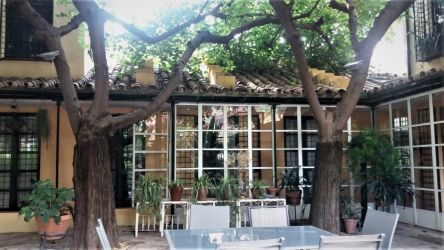The research team of the European Diverfarming project will analyse what the best combinations of crops are to improve the profitability of olive groves
Crop diversification and the search for improvements in both the economic profitability as well as in the environmental sustainability of European farms will be the protagonists in one of the “Science Patios” framed within the European Researchers’ Night that will take place on Friday 28th September at 9pm.
 Diverfarming, financed by the European Commission through the Horizon 2020 programme, proposes the combination of related crops coupled with the reduction in the resources used in agricultural companies (water, fertilisers, energy, etc) with the aim of reducing the erosion and soil loss that an important part of the agricultural community is suffering from, and increasing the biodiversity and therefore the economic security.
Diverfarming, financed by the European Commission through the Horizon 2020 programme, proposes the combination of related crops coupled with the reduction in the resources used in agricultural companies (water, fertilisers, energy, etc) with the aim of reducing the erosion and soil loss that an important part of the agricultural community is suffering from, and increasing the biodiversity and therefore the economic security.
In Andalusia, the RNM 922 SUMAS Research Group from Faculty of Sciences University of Cordoba is carrying out the diversification of a traditional olive grove located in Torredelcampo (Jaén) crossed by gullies and affected by soil losses. By means of alley cropping, involving the inserting of oat and vetch for animal feed and aromatic plants such as lavender and saffron in the alleys of this olive grove, it is sought to improve the soil’s health and to increase the economic benefits of having two different harvests, which will enable the stimulation of employment in the agricultural sector and will anchor the rural population in these zones.
The state of these trials and the future perspectives of counting on this type of sustainable agriculture will be the main topic of the conversation that the research group of the UCO will share with those attending the activity of “Crop diversification to improve profitability”. Through the relaxed dialogue in a close setting – the Cordoba patios – researchers and those attending will share points of view, current practices and visions for the future.
The research group AGR 165 Unidad de Edafología of the Agronomic department at the UCO will also be present in the patio to analyse the consequences of each type of agriculture on the soils, which are constituted as a vitally important resource to be able to feed the population and maintain the stability of the agricultural sector.
To attend the activity, which is completely free of charge and is open to everyone, you need to reserve in advance in the web page of the Noche Europea de los Investigadores.
Diverfarming is a project financed by the Horizon 2020 Programme of the European Commission, within the challenge of “Food Security, Sustainable Agriculture and Forestry, Marine, Maritime and Inland Water Research and the Bioeconomy”, which counts on the participation of the Universities of Cartagena and Córdoba (Spain), Tuscia (Italy), Exeter and Portsmouth (United Kingdom), Wageningen (Netherlands), Trier (Germany), Pecs (Hungary) and ETH Zurich (Switzerland), the research centres Consiglio per la ricerca in agricoltura e l'analisi dell'economia agraria (Italy), the Consejo Superior de Investigaciones Científicas (Spain) and the Natural Resources Institute LUKE (Finland), the agrarian organisation ASAJA, and the companies Casalasco and Barilla (Italy), Arento, Disfrimur Logística and Industrias David (Spain), Nieuw Bromo Van Tilburg and Ekoboerdeij de Lingehof (Netherlands), Weingut Dr. Frey (Germany), Nedel-Market KFT and Gere (Hungary) and Paavolan Kotijuustola and Polven Juustola (Finland)).










